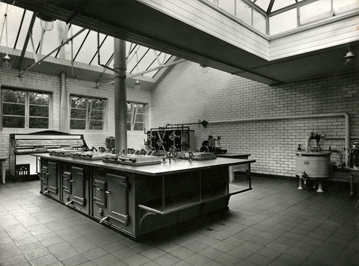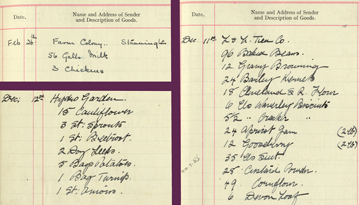|
Kitchens & Importance of Diet
Good food was an important component of sanatorium treatment as it was and still is well recognised that a well-balanced diet is essential in determining good health. Malnourishment and poor living conditions were often a significant contributing factor when it came to people contracting TB and in turn one of the main side-effects of the disease was the physical wasting away of the patient. For many young children coming from poor backgrounds the chance of being well-fed was in itself a potentially life-changing opportunity and some will no doubt have encountered food in the sanatorium that they'd never seen before.
The sanatorium maintained some level of self-sufficiency with milk and other dairy products being supplied largely by the farm colony. When the sanatorium moved to the Hexham Hydro during WWII a large amount of produce was provided from the gardens there. The fruit and vegetables grown were varied and included parsley, carrots, leeks, potatoes, rhubarb, onions, turnips, cauliflower, tomatoes, kidney beans, and apples to name but a few.
In addition the sanatorium's old supply books show regular purchases of fish from a Mr T Murray, including cod, haddock, herring, kippers, and plaice. Mr Murray also on occasion supplied them with rabbits, fowls, and sausages. A large and regular supply of meat was also maintained from one Mr T Fail, a Morpeth butcher, with items such as steak, lamb, sirloin, suet, and chops often on the supply lists.
Most other supplies were purchased from the London & Newcastle Tea Co., one of the country's earliest chain stores, which was established in 1875 and had its original offices in Charlotte Square, Newcastle. Goods procured from here ranged from golden shred marmalade to bacon, and Carr's chocolate biscuits to lentils. The company went out of business around 1960 but appears to have supplied the sanatorium for many years.
|
|


Click Images to Enlarge
|